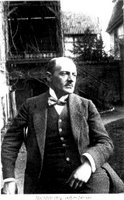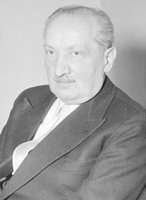Heidegger vs. Scheler: Part II, The Anthropological Problematic


In order to decipher the meaning of John White’s comparison mentioned in Part I, which is my eventual goal, it is important to see how Heidegger criticizes Scheler in the beginning of Being and Time. His criticism is not so much a criticism of Scheler’s philosophy specifically, but one of the employment of philosophical anthropology in general, of which Scheler (and Husserl for that matter) is a notable proponent, especially for Heidegger, a fellow phenomenologist and Husserlian. Furthermore, we also see that Heidegger’s criticism is not even one pertaining to anthropology in terms of its personalism, i.e., he is not criticizing the anthropology itself, but only the starting point of anthropology. Anthropology wrongly begins by first describing being (essences) and fails to consider the more primordial question, the Being of those beings. There lacks then a “fundamental ontology” upon which to even begin the work of interpreting the meaning of being: “what is man?”
But in Heidegger’s description of Scheler’s anthropology and personalism—as spirit defined in terms of its acts and opposed to something substantial, and therefore something all together different from the soul and body—it is evident he treats only the very “essential” elements of Scheler’s anthropology, i.e., those elements of Scheler’s account that have to do with his description of the essence of the person (spirit) and the whole personal being. And thus, Heidegger’s criticism works. But the question is whether Heidegger’s too brief account of Scheler does the anthropologist justice in finding some elements within the whole of Scheler’s philosophy (and therefore not restricted to his anthropology) that might account for a kind of “fundamental ontology,” or something that does “reach the dimension of the question of being in Da-sein” (BT, §47). Something that is on the level of Heidegger’s “being-in-the-world.”
This question is not a rhetorical one, by which I mean, I have no idea whether such a notion actually exists in Scheler! But this is a process, and is the difference in writing on a blog and writing for a journal: I am allowed not to have a conclusion prior to beginning the question; however, I am willing to bet I will come up with something…, One thing is for certain, if something of this kind can be discerned in Scheler’s work, it will surely not be explicit as Heidegger’s analysis of “the fundamental constitution of Da-sein”: being-in-the-world. But the problem of anthropology provides a starting point and John White’s comparison which began this project gives us a conclusive hint: I imagine it will have something to so with “being-toward-value.”


